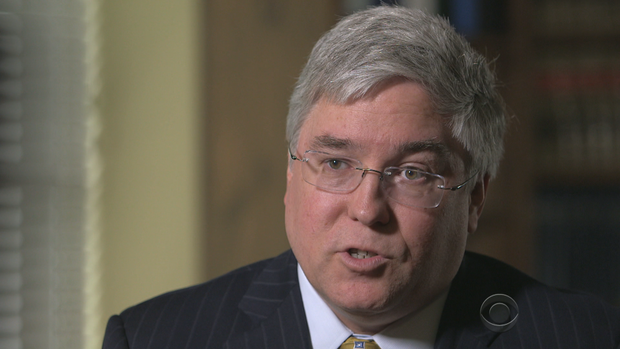West Virginia AG's past work with drug companies questioned
The battle against opioids in West Virginia -- the state with the country's highest rate of fatal overdoses -- is being fought on many fronts.
"What's happening in West Virginia right now is that we're losing a generation of people to despair," said Patrick Morrisey, West Virginia's attorney general.
In the last five months Morrisey has implemented new statewide prescription guidelines. He's moved forward with a lawsuit he inherited from his predecessor against eleven major drug distributors.
He also filed a new suit against the nation's top drug wholesaler, McKesson, for flooding the state with 100 million pain pills in a five year period.
But the fight against opioids in West Virginia is complex, as one look at Morrisey's career path makes plain.
"In my past practice I was the co-chair of a large healthcare pharmaceutical practice. But I had worked on Capitol Hill before. So I've done a lot of compliance work, regulatory work," Morrisey told CBS News.
"From 2010 to 2012 were you lobbying on behalf of health care companies, pharmaceutical distributors?" we asked him.
"Well I was a private lawyer and we did do some lobbying work," Morrisey explained.
As a lobbyist, Morrisey was paid $250,000 to represent a pharmaceutical trade group funded by some of the same distributors West Virginia is now suing.
Records show he also took more than $8,000 in political contributions from Cardinal Health, a defendant in one of the state's lawsuits. The West Virginia bar was concerned enough about a potential conflict to launch an investigation.
When he first took office in January 2013, Morrisey said he would step away from cases involving Cardinal. But five months later he met with senior representatives from the company.
"Is it appropriate for you to be meeting with two executives and a lawyer for Cardinal Health care when the state is suing them?" we asked.
"Well, as you know, the state meets with entities involved in cases all the time. And I would argue, we should meet with everyone involved across the board to go solve this problem," Morrisey responded.
Two months later, Morrisey again clarified his position -- saying he was now "permanently screened" from the case.
That didn't end the questions. Morrisey's wife is a lobbyist. One of her biggest clients? Cardinal Health.
While he's been in office, his wife's firm has made roughly a million and a half bucks from Cardinal. "I -- you'd have to talk and take a look at those numbers. I don't pay attention," Morrisey told us.
How does that not present an enormous appearance of a conflict, if not an actual conflict, CBS News wondered.
"Well I think we've gone through this, and people have determined that there was no conflict," Morrisey said in response.
The West Virginia bar ruled Morrisey's past lobbying work does not present an ethics issue now that he's Attorney General, but said his wife's work with Cardinal Health could "diminish the integrity of the process and create the appearance of impropriety."
The next five months will be a crucial time for Patrick Morrisey. Both of the state's lawsuits against wholesale pill distributors are slated for trial in October.
